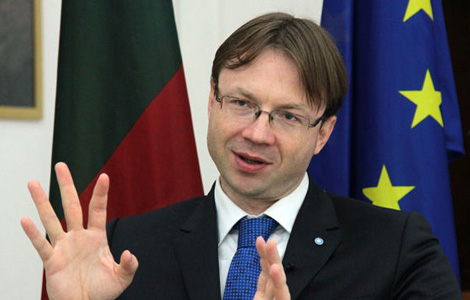Abe should seek reconciliation
Updated: 2013-07-17 09:16
By Cai Hong (China Daily)
|
|||||||||||
Japan and Germany shared similar experiences after World War II as they were subject to the post-war occupation policies of the Allied powers. But the sense of national guilt that was evident in Germany was not experienced in Japan. German citizens collectively acknowledged their responsibilities, while the majority of Japanese tend to think that there were two wars: one among the imperialist powers and the other against Asian-Pacific countries. This has enabled Japanese politicians to adopt aimai in their remarks on Japan's actions in the WWII.
At the 50th anniversary of the end of the World War II in 1995, reconciliation between victor and vanquished was intentionally displayed. The top leaders of more than 50 former belligerent countries including the United States, Britain, France, Russia and Germany gathered to attend the official ceremonies that were held in London, Paris, Berlin and Moscow on May 7 to 9, 1995. Former US vice-president Al Gore praised the "profoundly new relationship between victor and vanquished" that now binds Germany to its neighbors.
In contrast with the commemorations in Europe, which emphasized embracing multinational memories of the war, the official ceremonies held in the Asia-Pacific were characterized by national boundaries. Japan observed the anniversary with a ceremony attended by the emperor, the top leaders of the government, the Diet and the Supreme Court. Other East Asian nations held separate official ceremonies to celebrate their liberation from Japanese military domination.
Abe and his administration refuse to take any steps toward reconciling Japan with its neighbors. Instead, their attitude and words continue to widen the chasm between Japan and other countries in East Asia. South Korean President Park Geun-hye was reluctant to talk with Abe on the sidelines of a leaders' meeting of the Group of 20 economies in Russia in September, because of Abe's stance toward the crimes committed by Japanese military during the colonial rule of the Korean Peninsula before and during WWII, and a territorial dispute between the two countries. Park has urged Japan to create an atmosphere conducive for a summit with Abe.
Japan needs to reflect on how Germany has freed itself of its wartime baggage rather than claiming its neighbors have loaded the baggage on it.
New Komeito leader Natsuo Yamaguchi reminded Abe on Sunday that he should consider Japan's relations with China and South Korea when he draws up his schedule for Aug 15, the anniversary of Japan's surrender in the WWII. Yamaguchi was dropping a hint that Abe should not visit the Yasukuni Shrine.
In an interview with a Japanese magazine, Yohei Kono, former LDP leader with his name on a landmark 1993 apology over Japan's use of wartime sex slaves, asked Abe to state his position on the Yasukuni Shrine before the July 21 upper house election.
It is time for the Abe administration to clean its own house.
The author is China Daily's Tokyo bureau chief. caihong@chinadaily.com.cn
Related Stories
Abe's fault approach to China 2013-07-09 20:56
China urges Abe to face up to history 2013-07-03 21:16
Abe's 'values diplomacy' goes against the grain 2013-07-02 08:07
Japan highlights China as 'security threat' 2013-07-10 08:13
Abe must take action to improve China-Japan ties 2013-07-01 19:46
Today's Top News
'Missile equipment' found aboard DPRK ship
Merkel's rivals go on attack over US spying
Central govt sincere about HK universal suffrage
China signs co-op pact with Belarus
Gay marriage to be legal in UK
Egypt's interim govt takes oath
Li highlights economic restructuring
Philippines' accusation refuted
Hot Topics
Lunar probe , China growth forecasts, Emission rules get tougher, China seen through 'colored lens', International board,
Editor's Picks

|

|

|

|

|

|





